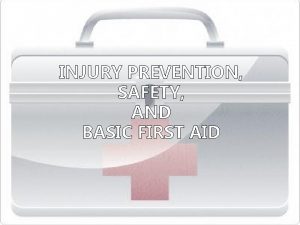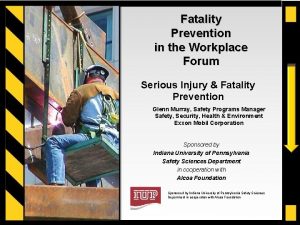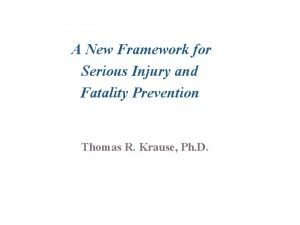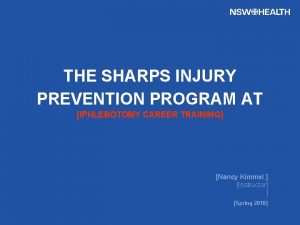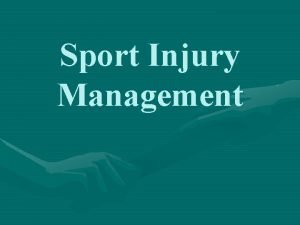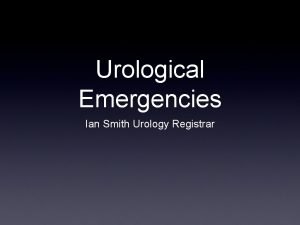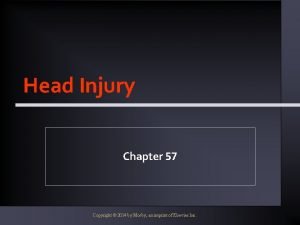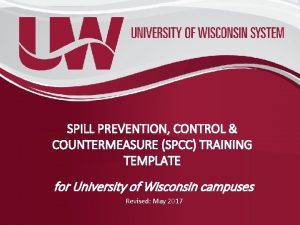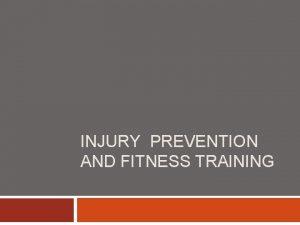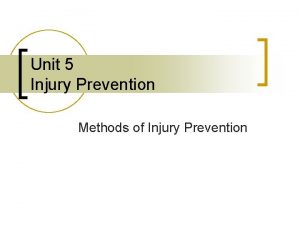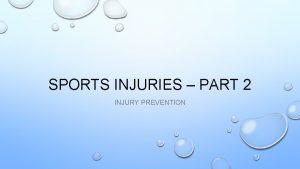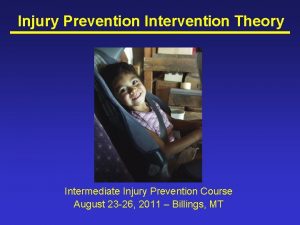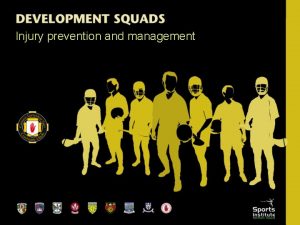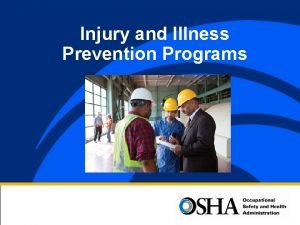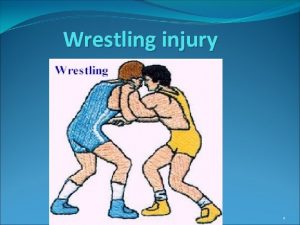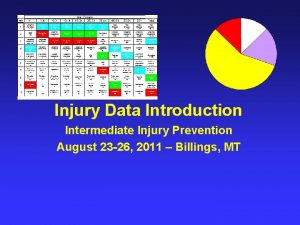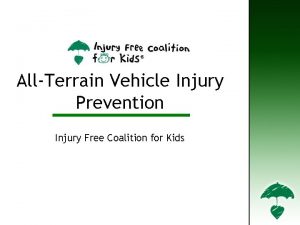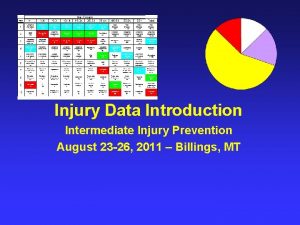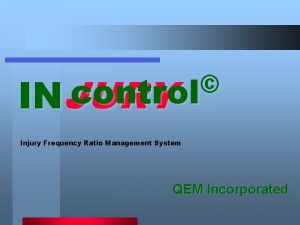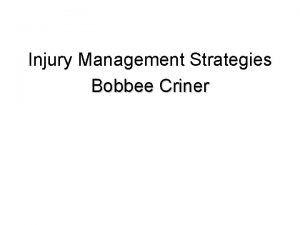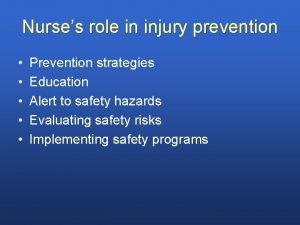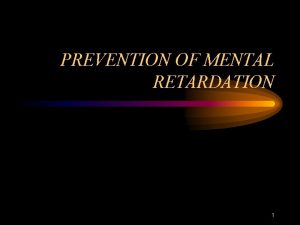Injury Prevention and Injury Management A system of




















- Slides: 20

Injury Prevention and Injury Management A system of processes that targets workplace physical injury reduction

Workplace injuries are at least a 50 Billion dollar annual problem in Australia Work Safe Australia 2008

near ZERO - Master Documentation near. ZERO - Injury Prevention and Injury Management processes build a custom management system that lowers the risk of physical injury in a work place Hence the overall cost to the Employer and Insurer is tightly managed and contained

The main aim of the near. ZERO approach is simply to enable workers to sustain their employment tasks at maximum physical efficiency If an injury does occur or develop then a comprehensive management system is already in place

near. ZERO processes produce a system that: Incorporates existing health, safety and wellbeing programs Focuses directly on each individual worker’s functional capability Matches ability to the inherent requirements of tasks

Roles to be played In a successfully working near. ZERO system three key roles are well defined and performed: o The near. ZERO Workplace Co-ordinator (internal) o The near. ZERO Project Consultant (external) o The near. ZERO Technical Advisor (human movement expertise)

In a near. ZERO system all Jobs: o Have been assessed for risks to a worker’s body (Physical Demand Assessment – PDA) o A functional (screening) test for every job has been designed o Every worker’s functional results are considered against their job’s PDA

Every worker for their job will have: o A unique Risk Profile describing their physical capacity o Risk Points assigned according to their functional test results o The opportunity to lower their Total Risk Points by improving their physical profile

Using the near. ZERO points system all workers are assigned an overall category of risk for their job: o Lower risk of injury o Medium risk of injury o Higher risk of injury o Remediation required o Conditional (new applicants)

For Effective Management: o The employer’s information system stores the results o The personal Risk Rating is discussed with workers o Workers are given assistance to improve their rating* * Data exists for regular management reporting of company wide and individual risk levels

Targeted Interventions Three types of risk lowering interventions are delivered: o Global: identified needs for a whole section of workers o Sub Group: small groups of workers with common needs o Individual: the needs are specifically known and unique

Injury Management: Minor injury recovery can often be effectively guided by the near. ZERO Technical Advisor and local medical expertise Major injury recovery may require external rehabilitation expertise in a coordinated return to work plan

External Rehabilitation: The near. ZERO Project Consultant has access to an Expert Rehabilitation Panel drawn from number of disciplines and able to work nationally The Project Consultant may assist the near. ZERO Workplace Coordinator to ensure progress in rehabilitation delivery

Maintaining the System Once the system is in place (Installation Phase complete) the system’s integrity must be maintained (Maintenance Phase) Audit* and Training Processes are by this time automatically in place * National and International Standards referenced where applicable

A final but most important question - Who are the winners in this process?

The Employer Saves: o Down time - by not having to change work tasks o Retraining time - by not redeploying good workers o Recruitment time - by not having to replace workers o Management time - lower injury rates require less management o Premiums - by quantifying and lowering risk Overall Productivity increases

The worker - Their livelihoods and health are more protected as they know their body’s strengths and limitations. They know how to improve their physical health and how to safely perform their specific work tasks Any union - The duty of care of their members increases. The facts and not just conjecture are “on the table” at any time

Any Insurer - has very accurate information, including the near. ZERO risk points system and PDAs, giving more control over all aspects of insuring and claims management Any Medical Provider has their job made easier as they have access to a worker’s Risk Profile and workplace PDA

In Summary: The Employer has cost effective and active management of workers physical performance of their jobs. Bottom Line: Productivity and Profitability Improved

Cost Benefit* typically 6 to 10 times initial outlay Dependent on level of internal expertise near. ZERO builds on existing internal capacity *
 Primary prevention secondary prevention tertiary prevention
Primary prevention secondary prevention tertiary prevention Injuries first aid
Injuries first aid Workplace fatality prevention
Workplace fatality prevention Serious injury and fatality prevention
Serious injury and fatality prevention Intentional injury and unintentional injury
Intentional injury and unintentional injury Needle stick injury prevention images
Needle stick injury prevention images Back injury prevention quiz answers
Back injury prevention quiz answers Hand injury prevention
Hand injury prevention Sharps injury prevention program
Sharps injury prevention program Atlas injury prevention
Atlas injury prevention Flipchart on safety practices and sports injury management
Flipchart on safety practices and sports injury management Dartos tissue
Dartos tissue Troy injury management
Troy injury management Head injury nursing management
Head injury nursing management Intrusion prevention system open source
Intrusion prevention system open source Wireless intrusion prevention
Wireless intrusion prevention Configure ios intrusion prevention system (ips) using cli
Configure ios intrusion prevention system (ips) using cli Ips intrusion
Ips intrusion Closed open and isolated systems
Closed open and isolated systems Circularory system
Circularory system Spcc template
Spcc template

